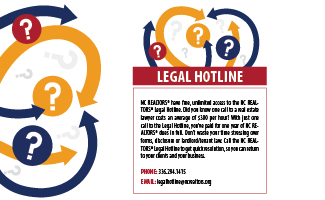Under Pressure

 The Legal Hotline’s Biggest Questions Post-NAR Settlement
The Legal Hotline’s Biggest Questions Post-NAR Settlement
BY JOHN WAIT, General Counsel
Oof! A lot has happened since the last legal update in this magazine. I don’t know if it’s been a concerted effort or not, but you guys have put the Legal Hotline through a major stress test. We survived – sort of. Let’s just say my already thinning hairline didn’t stand a chance. But, hopefully, we helped you avoid some of the biggest landmines as the new MLS rules rolled out.
In this article, we’ll dive into some of the most common questions still coming through the Legal Hotline, specifically related to changes following the NAR settlement.
1. When should I check the “Seller” box in paragraph one of Form 220 (Cooperating Compensation Agreement)?
Answer
Whoever is paying the cooperative compensation should be checked in paragraph one. For example, if the seller has authorized cooperative compensation in a listing agreement, then the “Listing Firm” box should be checked in paragraph one. This is because the cooperative compensation will be paid from the proceeds the seller is paying to the listing firm. If the seller has not authorized cooperative compensation in the listing agreement, but later agrees to pay cooperative compensation directly to the buyer agent, then the “Seller” box should be checked.
Paragraph 3 of Form 220 makes clear that the party checked in paragraph one and the selling firm must sign for Form 220 to be effective. However, as a best practice, all parties should sign to ensure everyone understands how compensation will be paid. Weekly Q&A dated 8/8/2024.
2. What if the listing firm does not communicate with me? How can I submit my buyer’s offer if my buyer needs help paying my compensation?
Answer
We consulted with Regulatory Affairs at the Commission. They have said that you might consider, as a final resort, submitting your buyer’s offer to the listing agent along with a separate proposed Form 220. This means, for example, you could email your buyer’s offer to the listing agent in an email where an Offer to Purchase and Contract (Form 2-T) and Form 220 are both attached to the email but as separate documents.
If the buyer directs you in writing, you may explain, in the email or other writing, that the buyer’s offer is contingent on the seller’s or listing agent’s separate agreement as to cooperative compensation. Agents are strongly recommended to consult with their BIC and legal counsel to make sure any such conditional language used in this scenario will be effective and achieve the intended result. As an additional safeguard, however, you may send the offer to the listing agent unsigned by the buyer. Weekly Q&A dated 8/8/2024.
3. Does the Zillow Touring Agreement comply with MLS Rules and the License Law in North Carolina?
Answer
Regulatory Affairs at the Commission has reviewed and approved the most recent touring agreement from Zillow for compliance with their rules. The updated form also contains the terms and disclosures mandated by the NAR settlement. The specific terms needed in any written buyer agreement are described in detail in an article titled “Written Buyer Agreements 101,” which can be accessed on NAR’s website. If your firm has a custom touring or showing agreement, it must also comply with the License Law.
It should also be noted that NCR will likely release new forms and updates to existing forms periodically during this forms cycle before July 1, 2025. As of the writing of this article, the Forms Committee is hard at work considering its own version of a touring or showing agreement as well as important changes to the standard form buyer agency and listing agreement. To stay abreast of these updates as they come out, please be sure to subscribe to the REALTOR® Rundown and make sure it’s not going to your spam folder! Weekly Q&A dated 8/15/2024.
4. When do I need a written buyer agreement?
Answer
You need a written buyer agreement any time you are “working with” a buyer and are getting ready to tour a property, either virtually or in person. Up until showing, you may continue to work with a buyer under oral buyer agency. “Working with” means providing the buyer services as the buyer’s agent. So, if you are a listing agent or a seller subagent (an agent who is helping the buyer but actually only represents the seller), then you do not need a written buyer agreement.
In North Carolina, written buyer agreements must also be agency agreements under the License Law. Listing agents that are conducting open houses need written buyer agreements if they are potentially offering dual agency to prospective buyers who are not already under agency. Weekly Q&A dated 8/15/2024.
5. Can a listing firm change cooperative compensation once a buyer’s offer is received?
Answer
It depends. If a listing firm has advertised that cooperative compensation will vary depending on a buyer’s offer, then this is not a blanket offer of cooperation. Instead, the listing firm has made clear that cooperative compensation will depend on what the buyer’s offer says. It stands to reason that any offer of cooperative compensation will vary and may change even after the buyer’s offer is submitted. If the listing firm has made a blanket offer or negotiated cooperative compensation with the buyer agent and come to an agreement, then the listing firm may be in violation of Article 3 of the Code of Ethics if they later attempt to unilaterally change the agreement for cooperative compensation. Agents should also bear in mind that both the Code of Ethics and the License Law prevent agents from using their client’s offers or counteroffers as weapons to interfere with another broker’s agency agreement. Weekly Q&A 9/5/2024.
6. The closing attorney and my buyer’s lender have asked that I provide them with the buyer agency agreement. Is this allowed?
Answer
Brokers should promptly share agency contracts with the lender and closing attorney involved in the transaction upon request. Failure to inform the lender of the buyer’s financial obligations and closing costs might result in the buyer being unable to close due to insufficient funds. Additionally, closing attorneys may request to see all contracts between the parties and their agents, along with any cooperative compensation agreements, to ensure a full and accurate representation of the transaction on all closing documents. Weekly Q&A dated 8/29/2024.


